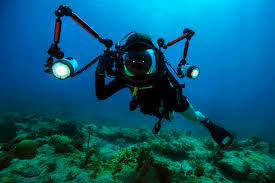Marine biology deals with the study of marine organisms, marine ecosystems and marine preservation. This field encompasses many disciplines and specialties that all stem from the marine sciences.
Education
 While there are many career opportunities in marine biology that can be obtained with a bachelor’s degree, many require education at the graduate level. Additionally, aPhD is required if you one day wish to conduct independent research.
While there are many career opportunities in marine biology that can be obtained with a bachelor’s degree, many require education at the graduate level. Additionally, aPhD is required if you one day wish to conduct independent research.
A bachelor’s degree in marine biology isn’t necessary to pursue a graduate degree in marine biology, however, you should consider guiding your focus towards the sciences. Courses in ecology, organic chemistry, oceanography, marine zoology and biodiversity will be particularly useful.
A master’s degree in marine biology or a related field will take about two years to complete after undergraduate school. A marine biology degree at the master’s level will cover advanced marine biology, biological oceanography, marine chemical ecology and molecular biology. These courses, along with internships, will prepare you for higher-level positions in your field, as well as careers in research, teaching or consulting.
Depending on your specific program requirements, a Ph.D. in marine biology can take anywhere from three to six years to complete after earning your undergraduate and graduate degrees. The courses you take will depend heavily on your area of specialization and you will be required to conduct research and fieldwork in order to write your dissertation.
Career
There are many directions a career in marine biology can take you. The diverse career paths within this field include, but are not limited to, wildlife biologist, zoologist, fish and wildlife biologist, fisheries biologist, aquatic biologist, conservation biologist or biological technician.
The duties of these careers vary but often include collecting and analyzing research data. This includes how species interact with each other and with their environments. It can also include how marine ecosystems affect humans and vice versa. Depending on your specific area of study, your day-to-day duties may include monitoring marine life exposed to pollutants, testing ocean samples, preserving specimens, identifying unknown species or mapping the distribution, ranges and movements of marine populations.
Salary and Job Outlook
The Bureau of Labor Statistics (BLS) reports the average salary of zoologists and wildlife biologists as $57,710 per year, or $27.74 per hour, with an expected growth of 5 percent by the year 2022. While zoology is slightly different and broader than a career as a marine biologist, you can expect a similar salary and growth in this field.